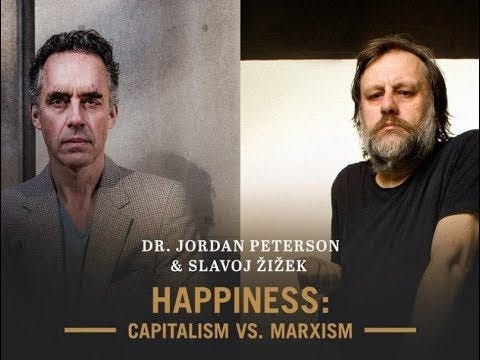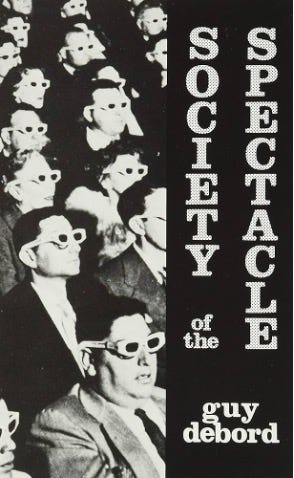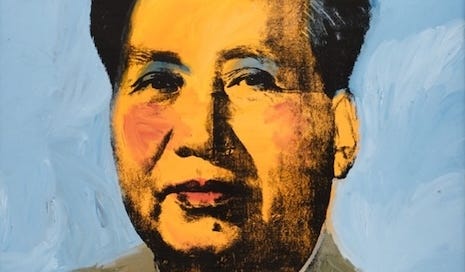Marx as Farce: Commodification of Revolution
How Slavoj Žižek became a Communist icon for a generation enamored with, beholden to, and in worship of the consumer-capitalist spectacle.
There is no greater example of the real Karl Marx (distinct from the pro-capitalist, pro-LGBTQIA2S+, pro-consumerism Karl Marx so popular in New Left circles) reduced to the status of a commodity than in the figure of Slavoj Žižek. Žižek is truly Marxist ideology reemerged as farce from the tragedy of Stalinism—that is to say more specifically that he is more akin to a Marxist comedian than as any sort of ideological devotee. In fact, he may even be the intellectual core of the new New Left, and the pro-capitalist devotees of American-consumer ideology are variations of the periphery of the central movement. His silly films and quotable quips, along with his idiosyncrasies and eccentric behavior, make him a perfect kind of celebrity for Youtube/ Tiktok/ Instagram Marxism.
On the other hand, he is a defanged intellectual both from history’s ugly relationship with Marxism and the intellectual stripping of the audience he appeals to, who is often wholly unfamiliar with the actual contents of the works of Karl Marx or any twentieth-century Left-wing intellectuals for that matter. Real Marxism, even when addressing it purely as ideology, is more often than not revolting to the individuals who quip the Communist Manifesto from their Twitch livestreams or who quote an article from the latest expensive glossy issue of Jacobin about why pornography and prostitution constitute modern necessities. Marx in his own day recognized that the introduction of feminism into the Marxist movement was a bourgeois imposition into the struggle of the workers, a kind of pseudo-revolutionary movement meant to make a stake for the bourgeoisie in the proletarian struggle. Would Marx have ever predicted that Marxism itself would transform itself into a pro-consumer, pro-capitalist movement, and that the disenfranchised would themselves participate on this level and for this cause? Debord certainly understood this when he warned of the subsummation of resistance into the capitalist order in Society of the Spectacle. If Marx was impressed by the sheer power of the bourgeoisie, how much more impressed he would have been at their ability to digest any and all opposition. The purpose of the social structure, according to the consumer ideologues, is to provide pleasure and entertainment. Labor is the source of all value? What about Funkopops? This is, essentially, the bleaching of Karl Marx himself more generally. Žižek, again, is Marxism as a kind of farce incarnate; Breadtube and this new New Left is Marxism as a commodity.
Žižek is safe both to the order he criticizes and his audience who absolutely needs Marxism reduced to the level of a palatable joke so that their love of videogames and pornography can go unchallenged. His direct audience, and more generally the spheres of influence a la Breadtube, transgender Youtube philosophers, and Instagram memelords demand this entertainment primarily and most of all from him.

Jordan Peterson, against whom he staged his most famous debate, in a sense creates a kind of perfect foil for Žižek which is why a debate was so essential between the two. Žižek himself shied away from Marxism by declaring he was actually more of a Hegelian, a statement that gives a sum total of zero people the slightest grip on what may constitute consistent political principles. Peterson is at least a tad confused about capitalism and Marxism, complaining that universities have fallen under an ideological capture but never bothering to really ask how or why—the answer as to why gender studies or race-hustling are occupying the academy or campuses or corporations is, in a sense, largely due to capitalism and the transformation of the university into a business. Those movements never were and never will be “communist” or “Marxist” in any genealogical sense of those words. In this debate between two men who answer and tell us nothing about capitalism and Marxism, we have to look to a deeper underlying grammar to truly understand even the Left’s real axe to grind is probably with Peterson telling adults to clean their room and go to work.
The debate virtually ended with Žižek and Peterson discovering that they have no real disagreements at all, other than a few silly “To the Gulag!” gags Žižek sputtered purely for laughs. So why was the debate called in the first place, if Peterson’s main objections to modernity are capitalism and Americanism (even if he isn’t fully aware of this fact) and Žižek is, in his own words, not really a Marxist? Because, again, Peterson enraged the Žižek-loving camp by demanding personal responsibility through his phrase “Clean your room.” Why would one dare to utter such a sentiment in a world populated by endless a la carte 24/7 entertainment? Jordan Peterson and Žižek debating Marxism is more akin to the current competitive relationship between China and the United States, where the true dialectic and debate represents a kind of Girardian mimicry in which the two opposing sides begin to increasingly resemble each other more and more as the competition continues.
Marx thought that the ailing petite bourgeoisie would, eventually due to their descent in status into that of the proletariat, join the worker’s revolution. But what if it was a bourgeois revolution? What about when the elites themselves revolted? Marxism simply can’t be accommodated by any group within the capitalist order, and so by nature—of reality? the dialectic?— the revolutionaries serve to make capitalism more seamless. We must remember that the fight against Communism and the Cold War more generally was not merely an external feud with the Soviet Union, but also was composed of an internal struggle with Communism in the West. Ideological Communism wasn’t trampled merely by logic or some kind of reasonable favorability, or even the tragic state of the Soviet Union. Communism’s popularity was lost by the sheer strength of the consumer spectacle itself—the argument against Communism was not lost by the disproving of such an idea, but by the positive pronouncement and the victory of the consumer spectacle. Even those in the West who drape themselves in Communist symbols openly espouse and panegyrize the consumer spectacle. This is in essence why Occupy Wall Street failed, and Black Lives Matter and the transgender/ gender/ LGBT movement succeeded. This is why Vaush defends student loans, debt, usury, and “libertarian socialism” (?) on videogame livestreams. This is why Alexandria Ocasio-Cortez wears designer “Eat the Rich” gowns to the Met Gala. We have to stop viewing these as contradictions and rather explore the subtext directly, perhaps even acknowledge that these “revolutionary” struggles are really between either the refinement of the individual as a consumer or the refinement of the capitalist society to accommodate the consumer class. The transformation of Marx into a commodity in this stage was a just reward for America’s victory over the Soviet Union and Chinese communism/ Maoism in the Cold War and the 1980s respectively

The prankster Žižek, regardless of his political philosophy, is at his core a clown for the oversocialized human product of the consumer spectacle. His contribution is not in his words, per se, but rather in the comedic act itself. His goal, even if he is unaware of it, is not to enlighten the masses about political systems, but to entertain—perhaps the highest vocation possible in the consumer spectacle.




